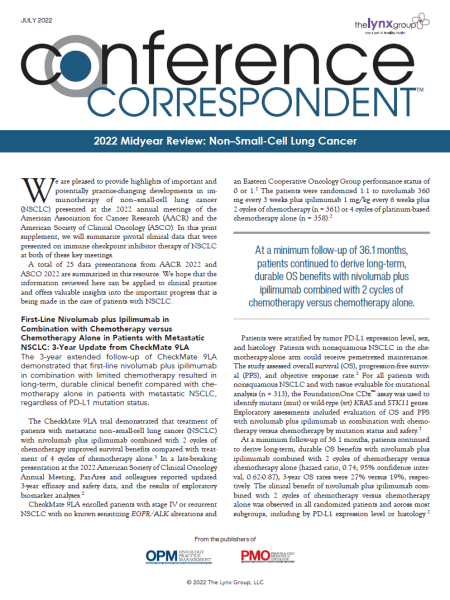Boston, MA—What is the best chemotherapy regimen to use for patients with locally advanced nonsquamous non–small-cell lung cancer (NSCLC)? The phase 3 PROCLAIM trial attempted to answer this question, but the study failed to determine the best regimen for this patient population.
At the 2015 Best of ASCO meeting in Boston, Sarah B. Goldberg, MD, MPH, Assistant Professor of Medicine (Medical Oncology), Yale Cancer Center, New Haven, CT, discussed the results of the study. PROCLAIM compared pemetrexed plus cisplatin and thoracic radiation followed by consolidation with pemetrexed (Arm A) versus etoposide plus cisplatin and thoracic radiation followed by consolidation therapy with etoposide plus cisplatin or the investigator’s choice of doublet (Arm B).
Both regimens are reasonable in locally advanced nonsquamous NSCLC, Dr Goldberg said. “There is no difference in overall survival, and it is doubtful that longer-term follow-up will make a difference. These findings are applicable to many of our patients who are eligible for platinum-based regimens, but not all patients are.”
According to Dr Goldberg, the results show “that there is less toxicity with pemetrexed/cisplatin, and it has an easier schedule than etoposide/cisplatin. But you have to factor in the financial toxicity of pemetrexed/cisplatin, even though this is hard to do with an individual patient.”
She said the jury is out regarding the need for consolidation therapy to be used in both arms of the trial, but that retrospective studies suggest it is not necessary. “Consolidation therapy is being used less and less.”
PROCLAIM enrolled 598 patients with previously untreated stage III unresectable nonsquamous NSCLC who were randomized to Arm A or Arm B. The patients whose disease did not progress continued with consolidation therapy. The study was closed in August 2012 because of a futility analysis.
The median overall survival was 26.8 months for the pemetrexed group and 25 months for the etoposide group. The 2-year survival rate was 52% in both arms; the 3-year survival rates were 40% with pemetrexed and 37% with etoposide. A subgroup analysis failed to show any preferential benefit for any subgroup in either arm.
Some differences in toxicity favored pemetrexed plus cisplatin. The difference was primarily driven by higher rates of neutropenia, thrombocytopenia, and alopecia in Arm B.
Dr Goldberg said that although both regimens in the study are “reasonable,” better treatments are needed to improve the median overall survival with platinum-based doublets. Hopes are currently riding on the promise of immunotherapy in lung cancer, she added.

